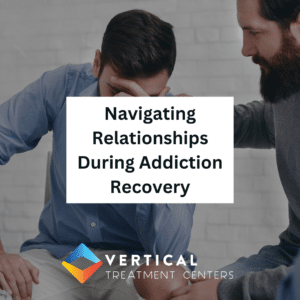
Navigating Relationships During Addiction Recovery
Maintaining and nurturing relationships is an ongoing challenge, but during addiction recovery, the quest becomes more compelling. In this post, we will explore the relationship dynamics during addiction recovery and offer guidance on how to effectively navigate these connections to create a supportive environment for recovery.
The Impact of Addiction on Relationships
Addiction, whether to drugs, alcohol, or other substances, can put immense strain on personal and professional relationships. Trust issues, emotional volatility, and communication problems can arise as addiction progresses, causing lasting damage in many cases.
Understanding the Importance of Relationships in Recovery
Positive relationships play a crucial role in providing support, encouragement, and accountability during recovery. A strong support network can aid in maintaining sobriety and dealing with setbacks as they arise.
Renegotiating Relationships Post-Addiction
Acknowledging that relationships may endure changes post-addiction is crucial for progress. To navigate these changes, several strategies include renegotiating relationship roles, establishing boundaries, and addressing expectations. Open and honest communication is key to this process.
Managing Relationships During Addiction Recovery
Family Relationships
Rebuilding family relationships during recovery may be challenging, as trust and communication may have been eroded. Strengthen those connections by:
- Actively engaging in open and honest dialogue about the recovery process.
- Taking responsibility for past actions and committing to making amends.
- Demonstrating consistency and accountability in recovery efforts.
Romantic Relationships
Maintaining and improving romantic relationships during recovery is vital for a supportive environment. Consider the following:
- Establishing mutual support to promote each partner’s well-being.
- Defining clear boundaries for an emotionally stable and healthy relationship.
- Prioritizing open communication about the recovery journey.
Friendships
Managing friendships during recovery involves:
- Identifying and letting go of toxic relationships hindering your recovery.
- Nurturing positive friendships that offer emotional support and harmony.
- Engaging in social activities that promote connection and discourage isolation.
Professional Relationships
To maintain a professional demeanor in recovery:
- Develop strategies to navigate stress in the work environment.
- Communicate with supervisors or colleagues about necessary boundaries.
- Seek balance in professional and personal life to prevent burnout.
The Role of Therapy and Support Groups
Therapy and support groups can provide essential tools and resources to help manage relationships during recovery. Counseling can focus on developing strategies to improve communication and address emotional stressors. Support groups offer an opportunity to forge new, healthy relationships with individuals who share similar experiences.
Overcoming Relationship-Related Setbacks in Recovery
Setbacks, such as relapses or relationship breakdowns, can occur during recovery, but resilience becomes the vital factor. Embrace the journey of recovery, adapt to changes, and maintain a proactive approach to managing relationships.
Conclusion
Managing relationships during addiction recovery is critical for personal growth and long-term success. By implementing the suggested strategies and seeking professional assistance when necessary, you can create an environment that fosters progress and support for your journey. The road to recovery may be winding, but with the right relationships by your side, the challenges can be surmountable.